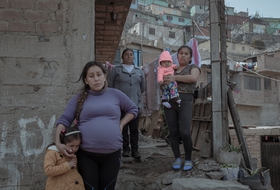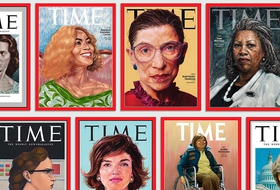
One in three women have suffered physical or sexual violence. With contributions from Europe, Africa, Asia and Latin America, we look at how this shadow pandemic affects every corner of the world.
Yesterday the EU Parliament in Strasbourg voted in favour of a resolution that, for the first time, explicitly acknowledges families with same-sex parents. The resolution, which tackles gender equality by setting new targets and strategies to improve women’s condition in the European Union, makes specific mention of how legislation must respond to changing family structures:
Yesterday the EU Parliament in Strasbourg voted in favour of a resolution that, for the first time, explicitly acknowledges families with same-sex parents. The resolution, which tackles gender equality by setting new targets and strategies to improve women’s condition in the European Union, makes specific mention of how legislation must respond to changing family structures: so that it be “more comprehensive with regard to single-parent families and LGBT parenting”.
Whilst the document is non-binding, it signals an ever-more favourable institutional climate in Europe with regards to LGBT rights. This isn’t the first time the EU Parliament has expressed itself on the issue of gay partnerships. In March, it voted for the recognition of civil unions and marriages between people of the same sex as fundamental human rights, encouraging its member states to embrace such principles in their national legislations.
Yesterday’s vote in the EU Parliament explicitly recognising LGBT parenting comes in the aftermath of watershed events in the advancement of gay rights in Europe. On the 15th of May Luxembourg’s Prime Minister Xavier Bettel married his same-sex partner, becoming the first EU head of state to do so. On the 22nd of May Ireland voted in favour of extending civil marriage rights to gay couples through a nationwide referendum.
Europe is leading the curve in its acknowledgement that all couples, regardless of their gender or sexual orientation, have the right to equal social and legal status. Yet a number of the continent’s countries, such as Italy and many eastern European nations, are resisting the inevitable seas of change. It’s time to fight for the recognition of same-sex marriage and parenting in these countries too.
Siamo anche su WhatsApp. Segui il canale ufficiale LifeGate per restare aggiornata, aggiornato sulle ultime notizie e sulle nostre attività.
![]()
Quest'opera è distribuita con Licenza Creative Commons Attribuzione - Non commerciale - Non opere derivate 4.0 Internazionale.
One in three women have suffered physical or sexual violence. With contributions from Europe, Africa, Asia and Latin America, we look at how this shadow pandemic affects every corner of the world.
The Istanbul Convention against gender-based and domestic violence marks its tenth anniversary. We look at what it is, who its signatories are, and what the future might hold.
European Commission President Ursula von der Leyen reminded us of the gravity of violence against women around the world, and of the Istanbul Convention’s utmost importance.
President Erdoğan has pulled Turkey out of the Istanbul Convention, key in the fight against gender violence, claiming that it favours the LGBT community rather than family values.
Violence against women in Peru has increased as a result of Covid-19 lockdowns. 14,912 people were reported missing from January to November 2020, more than half of them minors and 64 per cent women. People have been confined to their homes for months, many forced to endure poor physical, economic and social conditions. A situation that
Joys Estefani Qqueccaño Huamani, 24, disappeared from her rural community in Peru on 9 October. Her family began looking for her independently of the authorities and despite the resistance of relatives of Joys Estefani’s ex-partner Arturo Ccana Condori, 32, charged with committing violence against her on 28 September, eleven days before Joys Estefani disappeared. Photos
Costa Rica celebrated its first same-sex marriage when two women, Alexandra Quiros and Dunia Araya, celebrated their wedding: an “extraordinary moment”.
The pandemic and its restrictions are affecting everyone, without exceptions. However factors like housing, income inequalities, gender, access to technology and working conditions are influencing how people experience the health crisis.
Time magazine’s 100 Women of the Year project sheds light on influential women’s stories, from Amelia Earhart to Greta Thunberg. A selection of some of the greats for International Women’s Day.







